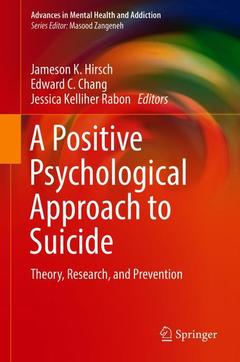A Positive Psychological Approach to Suicide , 1st ed. 2018 Theory, Research, and Prevention Advances in Mental Health and Addiction Series

This inspiring resource presents theories, findings, and interventions from Positive Suicidology, an emerging strengths-based approach to suicide prevention. Its synthesis of positive psychology and suicidology theories offers a science-based framework for promoting wellbeing to complement or, if appropriate, replace traditional deficit-driven theories and therapies used in reducing suicidal thoughts and behaviors. Coverage reviews interpersonal, intrapersonal, and societal risk factors for suicide, and identifies protective factors, such as hope and resilience, that can be enhanced in therapy. From there, chapters detail a palette of approaches and applications of Positive Suicidology, from the powerful motivating forces described in Self-Determination Theory to meaning-building physical and social activities.
Among the topics covered:
- Future-oriented constructs and their role in suicidal ideation and enactment.
- Gratitude as a protective factor for suicidal ideation and behavior: theory and evidence.
- Considering race and ethnicity in the use of positive psychological approaches to suicide.
- The Six R?s framework as mindfulness for suicide prevention.
- Community-based participatory research and empowerment for suicide prevention.
- Applied resiliency and suicide prevention: a strengths-based, risk-reduction framework.
Psychotherapists, counselors, social workers, psychiatrists, and health psychologists, as well as educators, clergy and healthcare professionals, will find A Positive Psychological Approach to Suicide an invaluable source of contemporary evidence-based strategies for their prevention and intervention efforts with suicidal clients.
Chapter 1: Positive Psychology and Suicide Prevention: An Introduction and Overview of the Literature.- Chapter 2: Future Oriented Constructs and their Role in Suicidal Ideation and Enactment.- Chapter 3: Forgiveness, Addiction and Suicide.- Chapter 4: Reasons for Living.- Chapter 5: Gratitude as a Protective Factor for Suicidal Ideation and Behaviour: Theory and Evidence.- Chapter 6: Considering Race and Ethnicity Using Positive Psychological Approaches to Suicide.- Chapter 7: Interpersonal Needs and Social Support.- Chapter 8: Encouraging Health-Promoting Behaviors in Primary Care to Reduce Suicide Rates.- Chapter 9: Future-Oriented Treatments for Suicide: An Overview of Three Modern Approaches.- Chapter 10: Meaning-Centered Men’s Groups (MCMG) for the Transition to Retirement.- Chapter 11: The Six R’s Framework as Mindfulness for Suicide Prevention.- Chapter 12: Community-Based Participatory Research and Empowerment for Suicide Prevention.- Chapter 13: Applied Resiliency and Suicide Prevention: A Strengths-Based, Risk-Reduction Framework.
Jameson K. Hirsch is an Associate Professor of Clinical Psychology, and Assistant Chair, at East Tennessee State University, and maintains faculty appointments in the Department of Psychiatry, University of Rochester Medical Center, the Department of Public Health, East Tennessee State University, and as a Research Scientist at the Mountain Home VAMC. Dr. Hirsch received his Ph.D. from the University of Wyoming, completed his APA-accredited internship at SUNY Upstate Medical Center, and his Post-Doctoral Fellowship at the University of Rochester School of Medicine and Dentistry. His research focuses on protective, positive psychological characteristics that might buffer against psychopathology, particularly depression and suicidal behavior, occurring in the context of medical illness and impairment and in underserved and under-represented groups, including rural, elderly and ethnic minority individuals. Dr. Hirsch has published over 125 peer-reviewed articles on protective factors, and he has presented his research more than 350 times at professional conferences. He currently serves on the Editorial Boards of Suicide and Life-Threatening Behavior, Cognitive Therapy and Research and International Journal of Mental Health and Addiction.
Edward C. Chang is a Professor of Clinical Science in the Department of Psychology and Professor of Social Work in the School of Social Work at the University of Michigan, Ann Arbor. He obtained his M.A. and Ph.D. degrees from the State University of New York at Stony Brook. He completed his APA-accredited clinical internship at Bellevue Hospital Center-New York University Medical Center. Dr. Chang has published nearly 200 works on personality, positive psychology, suicide risk, cultural differences, coping, and psychological adjustment. He has also edited more than a dozen books focused on optimism, personality, social problem solving, cognitive behavioral interventi
Highlights practical implications for field of suicidology
Emphasizes evidence-based prevention and intervention
Each chapter written by a current leader in positive psychology and suicidology
Date de parution : 03-2019
Ouvrage de 334 p.
15.5x23.5 cm
Thèmes d’A Positive Psychological Approach to Suicide :
Mots-clés :
positive psychology and suicide prevention; future-oriented constructs and suicide; hopefulness; optimism; and suicide; forgiveness and suicide; meaning; purpose; and suicide; cultural; racial; ethnic factors and suicide; spirituality/religiousness and suicide; interpersonal and social need satisfaction and suicide; positiv affect; personality; temperament and suicide; health-related quality of life and suicide; health behavior; exercise; nutrition; and suicide; future-directed therapy for suicidal ideation; motivational interviewing and suicide; self-determination and suicide; Mindfulness and suicide prevention; community-based participation and suicide; evidence-based suicide prevention and intervention



